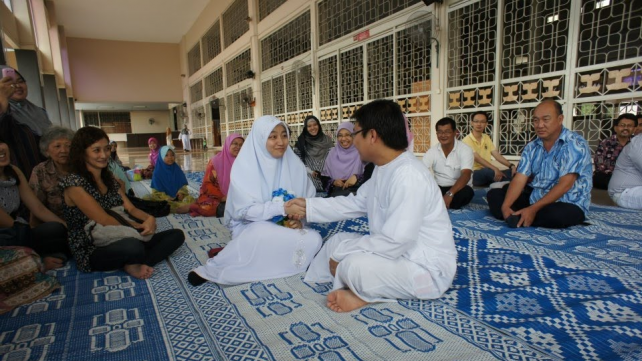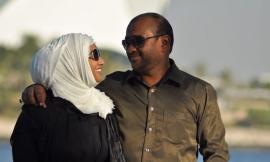
The Qur’an categorically states that the objective of marriage, besides perpetuating human life, is also spiritual harmony or creating "an abode of peace.” However, the Qur’an does not leave the marital relationship entirely up to individual consciousness or personal whims and desires, since in practice “marital relationships are too intimate and varied to lend [themselves] easily and entirely to the formal regulations of [a] legal system, however comprehensive.” (Ati, 1977)
The Qur’an describes the family as “an abode of peace,” a system with non- linear dynamics based on the inherent equality of men and women; it states that Allah “Created you of a single soul, put affection and mercy between your hearts.” (Qur'an 3:195)
Thus from a Qur’anic perspective, “The ethical principles of husband wife relationships are believed to derive from a conscientious commitment by both sides to the divine designation of marital union as an abode of peace and serenity.” (Ati, 1977)
Tranquility or the “abode of peace” in marital relationships is not based on gender distinction. Rather, it is an outcome of personal ethical behavior where two adults assume full responsibility for their own individual conduct in order to meet the religious obligations of mutual rights and responsibilities.
The Qur’an stresses that both men and women have an obligation to develop themselves spiritually and morally and to fulfill their social responsibilities. In this respect, the Qur’an is clear on the equal responsibility of both men and women for developing the public good. Indeed, it does not define tranquility in terms of masculine or feminine traits; rather, it takes humans to “manifest the whole.” (Murata, 1992)
“And remain conscious of Allah, in whose name you demand (your rights) from one another, and these ties of kinship. Indeed, Allah is watchful over you!" (Qur’an 4:1)
By placing marital relationships on the basis of mutual rights and responsibilities pertaining to both men and women, the Qur’an holds each member of a couple accountable to Allah for discharging their social obligations in an equitable and just manner. In fact, marital relationships serve as the arena for implementing equal evaluation of the behavior and actions of individuals, rather than specifying their gender or deeds.
This is consistent with the overall scheme of Qur’anic teaching in dealing with the definition and structure of family.
In view of these factors, many classical scholars have been led to stress only the socio-legal and contractual elements of Islamic marriage at the expense of its ethical and moral aspects. In fact, “The Qur’an and the Sunnah contain relatively minimal details regarding the legal specifics of family life. Yet it provides extensive ethical principles for marital relationships and family foundations... Unfortunately, over the centuries the majority of jurists focused their attention on the intricate, formal elaboration of these minimal details, almost to the exclusion of their ethical foundations.” (Ati, 1977)
There are several fundamental concepts that the Qur’an upholds in its overall scheme of the family system. At the foundation of this system is the oneness of Allah (God), called “Tawhid” -- one single entity as the source of all creation; the giver of laws and rules to maintain balance and order in the cosmos.
From this foundation come the principles of:
- Equality (a single point of human origin that negates superiority of either gender or race);
- Individual moral responsibility (the self that is responsible for personal acts);
- Free will (freedom of choice in one’s course of action);
- Guidance (the revealed text of the Qur’an as a direct link between the Creator and created);
- Justice (without which there can be no peace); and
- Mutual rights (entailing partnership, collaboration and team effort).
The Qur’an teaches that all human beings (men and women alike) have the “fitrah,” or inherent nature, to be God’s representatives on earth, and that they are equally capable of moral personality. In other words, it does not discriminate against human beings based on their biology.
Furthermore it emphasizes the principle of “piety,” which encompasses moral character and social integrity. These elements co-exist with belief in a state of compatibility. “The intention of Islam is that the marriage tie should be a charter of mutual honesty, truthfulness, loyalty and cooperation.”
The Qur’an even goes as far as to set the criteria for choosing a compatible mate when it says that “corrupt women are for corrupt men, and corrupt men for corrupt women -- just as good women are for good men, and good men for good women…” (Qur’an 24:26)
In addition, the Qur’an categorically forbids lust in marriage, saying that marriage should be based in “chastity, not lust.” (Qur’an 4:24)
Let us not forget that mutual affection and sexual fulfillment are comparatively recent developments influenced by Western culture. But the Qur’anic concepts of a marriage contract and of men and women living together in peace, tranquility, affection and mercy, on an equal footing as “vicegerents of Allah” are 1400 years old. In fact, this radical message from the Qur’an is one that Muslims for centuries have deliberately chosen to ignore … at their own peril.
The Qur’an stipulates that a marriage contract is a religious prerequisite for safeguarding the financial interests of the couple. It further stipulates standards of ethical and moral behavior as religious requirements to safeguard the integrity of both marital and family relationships. Both are essential to the system of Islam. (Qur’an, 30:30)
Unfortunately, a great majority of young Muslims have bought into the modern ideas that family and children are expendable in favor of individuality, money, and wealth. The future will not be very hopeful until our younger generation understands the Qur’anic marriage stipulations and abides by them, so as to re-establish the family as an abode of peace. "Do they not reflect on the Qur’an, or are their hearts locked up?" (Qur’an, 47:24)
May Allah guide us in the right direction. Keep making dua for successfull marriage. There are many set of dua for marriage you can find.
Excerpted from A Mosiac of Thoughts, Wahida Valiante's recently published book.
----------------
Sr. Wahida Valiante is currently the National President and founding member of the Canadian Islamic Congress (CIC) and the Chair of Islamic History Month Canada. She is a Canadian trained social worker and therapist who specializes in couple and family therapy, family mediation, domestic violence, and post traumatic stress disorder. In 2010 and 2011, Sr. Wahida was recognized among the "500 Most Influential Muslims in the World". She is the author of A Mosiac of Thoughts.








Add new comment